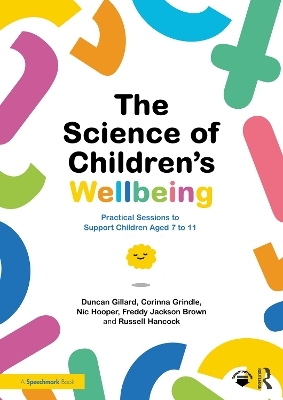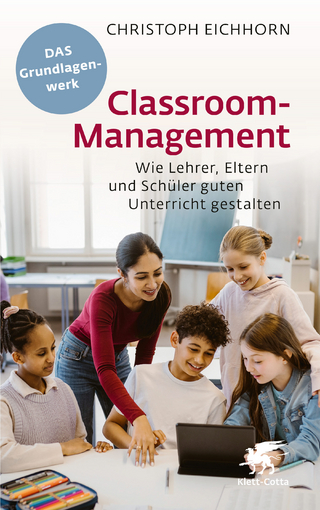
The Science of Children's Wellbeing
Routledge (Verlag)
978-1-032-38628-7 (ISBN)
This essential book is packed full of comprehensive guidelines and practical resources for running wellbeing intervention sessions for children aged 7 to 11, drawing from the scientifically grounded Six Ways to Wellbeing and the DNA-V model.
Each chapter focuses on one of the Six Ways to Wellbeing, six patterns of action known to correlate highly with aspects of positive mental health and wellbeing. These principles have been translated into 36 step-by-step sessions to develop children’s wellbeing and psychological flexibility and support those struggling with aspects of their mental health. The sessions can be delivered by educators with the whole class, with small groups as targeted wellbeing interventions or easily adapted to fit one-to-one contexts.
The Six Ways to Wellbeing sessions include:
• Be Active: Staying physically active and exercising regularly.
• Self-Care: Engaging in good quality self-care behaviours.
• Connect with Others: Connecting with others socially in ways that feel genuine, authentic and fulfilling.
• Give to Others: Engaging in kind, thoughtful and giving behaviours toward others and the wider world.
• Challenge Yourself: Encouraging learning that feels personally challenging to grow and develop new skills.
• Embrace the Moment: Taking notice of the world around you and embracing and appreciating the moment.
Easy to follow and requiring no previous training, this book is the ideal resource for primary school teachers and leaders, psychologists, mental health practitioners, school counsellors, SENCos, LSAs, ELSAs and learning mentors looking to support and improve children’s wellbeing within their professional roles.
Duncan Gillard is a Health and Care Professions Council (HCPC)-registered Educational Psychologist and experienced Acceptance & Commitment Therapy (ACT) trainer, author and practitioner. He is a Founding Partner at ConnectEd and a co-developer of the evidence-based children’s wellbeing curriculum, Connect PSHE. Corinna Grindle is an Associate Professor at the Centre for Educational Development, Appraisal and Research (CEDAR) at the University of Warwick, UK. Her research interests include curriculum design and effective instruction. Nic Hooper is an expert in Clinical Psychology and an academic at Cardiff University, UK. Freddy Jackson Brown is a chartered clinical psychologist with 25 years’ experience working with children and families in the NHS. Russell Hancock is Creative Director of the award-winning, Bristol-based design studio, Extra Strong. The company specialises in working within the arts and culture sectors and on projects that help improve society. Through this role, Russell created the brand identity for ConnectEd before becoming a co-director. All five contributors established the Connect Wellbeing in Education (ConnectEd) Partnership with the mission to increase the use of evidence-based, child-centred, values-led, effective mental health and wellbeing practices in schools.
Foreword
1. The Six Ways to Wellbeing
2. Be active
3. Self-Care
4. Connect with Others
5. Give to Others
6. Challenge Yourself
7. Embrace the Moment
8. Developing Outcomes and Date Informed Practice
9. Closing Reflections
Afterword
Index
| Erscheinungsdatum | 05.12.2023 |
|---|---|
| Zusatzinfo | 24 Tables, black and white; 46 Line drawings, color; 4 Line drawings, black and white; 1 Halftones, color; 47 Illustrations, color; 4 Illustrations, black and white |
| Verlagsort | London |
| Sprache | englisch |
| Maße | 210 x 297 mm |
| Gewicht | 780 g |
| Themenwelt | Sozialwissenschaften ► Pädagogik ► Schulpädagogik / Grundschule |
| Sozialwissenschaften ► Pädagogik ► Sonder-, Heil- und Förderpädagogik | |
| ISBN-10 | 1-032-38628-2 / 1032386282 |
| ISBN-13 | 978-1-032-38628-7 / 9781032386287 |
| Zustand | Neuware |
| Haben Sie eine Frage zum Produkt? |
aus dem Bereich


